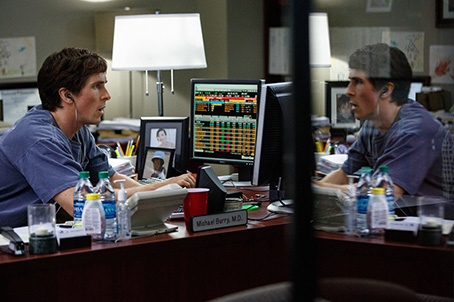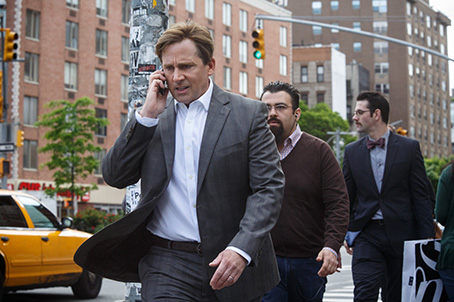| |
"I didn't find them that complicated once I'd done some research on them. The banks go out of their way to make them seem complicated. So I felt kind of confident that I could explain them, and if I could fuse that with these compelling characters and this crazy story they went through, this would be a really unique, original movie." |
| |
Director, Adam McKay on the intricacies of the banking world* |
He's not wrong. After the bloodletting of Tarantino's eight and being stuck frozen and ripped apart in Iñárritu's savage wilderness, I found Adam McKay's hugely entertaining movie on those who cashed in on the unthinkable, a real refreshing treat. It takes great skill to make a film on the subject of banking so soufflé-light, laugh out loud funny in some places and yet it boasts an emotional bite that draws blood. You are cheering on people who are trying to make money from a system failing, a system millions depend on. Talk about cognitive dissonance. Here is a movie that is irreverent, funny and is all about the banking business, one of the least cinematic subjects in human history. I still am of the opinion that you could make a film about the world's dullest subject and still have it glue you to the edge of your seat because of the way it's told. The Big Short is one such movie. The only negative thing I have to say about this lithe, streamlined, audacious and beautifully edited gem is that the title (which it shares with its parent book) does not reflect the experience you're in for in any way. It's like calling Ghostbusters, Destinations of the Converted Ambulance... What? It's technically correct but utterly meaningless. To those unblessed with not having seen the film, the title makes no sense. The Big Short. What's that, Tom Cruise? At least the book it's based on had a subtitle 'Inside The Doomsday Machine' which at the very least is significantly sexier. I also thought I'd found the best 'Easter Egg' joke in the movie and honestly believed for a whole day that I was the only one to have noticed it (ego much, Will?), but it's listed in the Trivia section on the IMDb, damn it. There's a wide shot after the Las Vegas scene that shows in the distance a massive poster advertising live shows from Steve Martin and Martin Short. Only the latter is visible so in a way, he's also "...The Big Short." So, to stop you from having title trouble, I will try to explain what a 'big short' actually is. In the world of financiers and bankers, a short position is the sale of a borrowed security, commodity or currency with the expectation that the asset will fall in value. Got it? And the movie has a big one in it. Let's not go any further than that. Let's just imagine there was a very smart guy who could read the numbers and subsequently bet against the surest investment since Wall Street began trading – property. Well, we don't have to imagine it. It really happened. Of course, he's set to lose money in the short term but the numbers tell him that by investing (that is 'losing') 'x' million, when everything goes south, he gains just under a 500 per cent profit. Smart guy.

Remember, as much as any Hollywood movie can be, this is a true story. This extraordinary man is Michael Burry played with subtlety and nuance by a surprisingly convincing Christian Bale, so far removed from Gotham City as it's possible to be and from Bale's point of view, I guess that was the point. Dogged by Asperger's Syndrome, one perched on the edge of one of the lower rungs of autism, he cannot detect or produce irony, is socially impaired and rarely makes eye contact. But he also has savant level number skills. Before anyone else, he spots that greed is fuelling a system that is doomed to failure. But convincing his colleagues over whom he has authority because of his innate skill is another job entirely. He places many 'shorts' in play with countless suave and lofty members of the financial institutions, all of whom smile and simply take his money. As Mark Twain so wisely says, quoted at the start of the film...
"It ain't what you don't know that gets you into trouble.
It's what you know for sure that just ain't so."
Seeing the incredulity on the faces of these superior financial players after Burry commits to his scheme makes you even more rabid to see what they'll look like once, at best, they have to eat humble pie for years and at worst, lose their jobs having made millions of people's lives significantly more miserable. It is the most bizarre fact that those thousands accountable for the meltdown never faced any legal repercussions. It's like the law was temporarily put on hold because everyone was doing it...
This unusual behaviour from a minor but prescient player in the industry is remarked upon and his scheme comes to the attention of the chic trader Vennet (Ryan Gosling). He's smart enough not to dismiss this innovative take on the housing market and digs deeper. What he finds confirms Burry's own conclusions on the business and the smell of money gets stronger. It's worth mentioning here that the movie plays all sorts of mischievous games with film form. The fourth wall (the invisible wall we are able to watch movies through) is broken without fear and often. Vennet could be seen as our initial narrator as he speaks directly to us, yes us, just as Frank Underwood does in House of Cards. Smaller characters will suddenly turn to us and clarify an obscure point or correct the leads for accuracy's sake. But when McKay and his co-screenwriter Charles Randolph want to throw out a metaphor to explain industry jargon, they are brave enough to step right out of the movie and hand it over to a 'guest' to explain it and these should not work but they do. In order to explain what the term sub-prime means, they enlist a bubble-bathed, champagne-sipping Margot Robbie to do the honours. Her final line came as such a shock, I barked out laughing. This also made me aware of the complexity of the editing, both picture and sound. The comic timing of Burry's deals getting higher and higher is a marvel of both picture and sound editing. Take a bow editor Hank Corwin, sound designer Andrew DeCristofaro and supervising sound editor, Becky Sullivan. Sometimes the cuts seem ragged. There's a shot of a statue of Caesar that holds and then in blink-and-you'll-miss-them frames, there's a camera jerk to the right. I would usually be critical of such carelessness but here, in the zippy camera, snatch what you can aesthetic, it works better than it should.

Through a call to a wrong number, hedge fund manager Mark Baum is brought into the mix. Like all four leads, Steve Carell is playing a fictionalized version of a real person. His team is incredulous but the Dudley Do-Right of the shady deals business wants Burry's predictions to be true. It'll give the moralistic Baum more ammunition to root out greed and stupidity amongst those who hold millions of lives in thrall. He soon finds out that greed and stupidity is the norm fuelling his campaign even more. Rounding out the bloodhounds on the scent of getting hugely rich by anticipating a colossal crash are the two neophyte investors, Charlie (John Magaro) and Jamie (Finn Wittrock). At first they falter trying to get a place on the big boys' table but their thinking is sound and with the help of retired banker Ben Rickert (Brad Pitt), they start putting a lucrative deal in place. Pitt plays the moral centre of the movie in that he is disgusted by the pair's blatant disregard for the consequences of what they stand to make a fortune from – the degradation of millions and the loss of homes, capital and in some cases, life.
If a movie has its cake and eats it, it's The Big Short. It manages to shed some light on a barren place of obfuscation, black velvet, whispers and smoke and it does it in a bravura style. This movie skips seemingly unmoored as it enlightens. I didn't feel like I could challenge Gordon Gecko after seeing it but I did feel that I'd learned something and that the metaphors used were solid. Industries use jargon to isolate and befuddle outsiders. See Edward Norton's boss in Fight Club for a prime example of a man taken in by his job's jargon. My favourite on this topic is the jargon Apple uses (Apple Desktop Cinema Display) to describe 'the screen'. Why call it a pooh when you can call it an 'Armitage Shanks interface defecation scenario'? Thanks to Chris Morris' The Day Today for that gem. Each one of the celebrity metaphor explainers is clear, concise and entertaining and you come away from the movie thinking you are a little (not too much, but a little) more informed. The Big Short is a fascinating and informative movie that won't snag Best Picture at the upcoming Oscars but it is lovely to see it on the same sofa as the big hitters. That it's really funny in places is a lovely surprise. It's well worth checking out.
*http://www.vox.com/2016/1/4/10707248/the-big-short-review-interview |